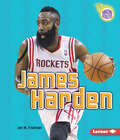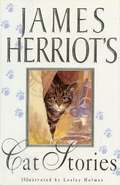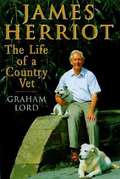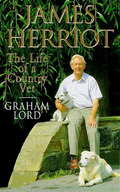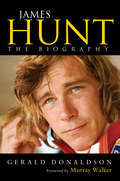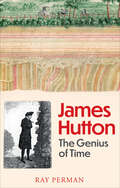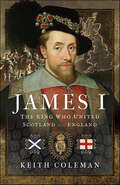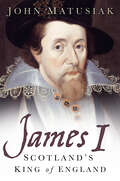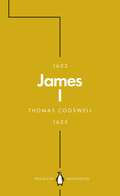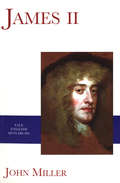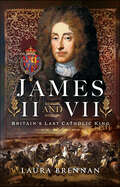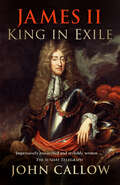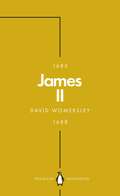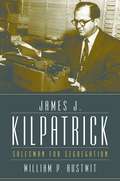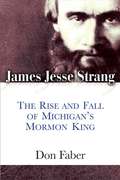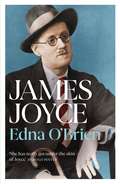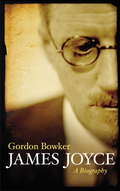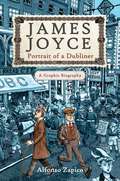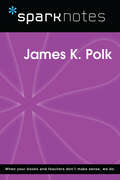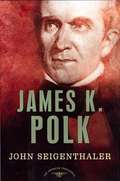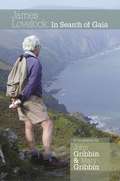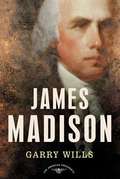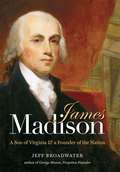- Table View
- List View
James Harden (Amazing Athletes Ser.)
by Jon M. FishmanHouston Rockets guard James Harden lit up scoreboards to the tune of more than 25 points per game in 2014-2015. That made him one of the best scorers in the league. But he wasn't always such a star player. When James played for the Oklahoma City Thunder from 2009 to 2012, he started only seven games. After signing on with Houston for the 2012-2013 NBA season, James exploded as one of the top players in the NBA. Read all about James's journey from his birthplace in Los Angeles to NBA stardom in Houston.
James Herriot's Cat Stories
by James HerriotKittens and cats of all kinds abound in this book and, like their flesh-and-blood counterparts, they will purr their way into the hearts and minds of everyone who hears their stories. This warm and joyful volume of stories collects some of the Yorkshire vet's favorite tales about one of his favorite animals―each memoir as memorable and heartwarming as the last.
James Herriot: The Life Of A Country Vet
by Graham LordLord writes a revealing and affectionate biography of the remarkable veterinarian and beloved author who enlightened readers with All Things Bright and Beautiful and All Creatures Great and Small.
James Herriot: The Life of a Country Vet
by Graham LordAlf Wight, a modest Scottish writer, better known as James Herriot, wrote books that became worldwide best sellers, films, audiobooks, and a much-loved television show. In The Life of a Country Vet, Graham Lord has written a detailed and affectionate biography of this remarkable man. Lord carefully documents Wight's life, beginning with his childhood in Glasgow and his years in veterinary college. Following his development as a writer, the source of his pen name, and his struggles to get published. Along the way, we encounter some extraordinary events and hidden tragedies in this seemingly magical life. Millions of fans laughed and cried at Wight's delightful stories of life as a vet. Lord reveals that some of the stories were utterly true, and some were utterly fictional. He illuminates the real relationships between the memorable characters that inhabit the books. This warm yet insightful portrait by Lord - who knew his subject very well - will be enjoyed by Wight's myriad of fans. It also dispels the myths that have grown around the life of one of the most famous and deeply loved vets the world has known.
James Herriot: The Life of a Country Vet
by Graham LordAlf Wight, a modest Scottish writer, better known as James Herriot, wrote books that became worldwide best sellers, films, audiobooks, and a much-loved television show. In The Life of a Country Vet, Graham Lord has written a detailed and affectionate biography of this remarkable man. Lord carefully documents Wight's life, beginning with his childhood in Glasgow and his years in veterinary college. Following his development as a writer, the source of his pen name, and his struggles to get published. Along the way, we encounter some extraordinary events and hidden tragedies in this seemingly magical life. Millions of fans laughed and cried at Wight's delightful stories of life as a vet. Lord reveals that some of the stories were utterly true, and some were utterly fictional. He illuminates the real relationships between the memorable characters that inhabit the books. This warm yet insightful portrait by Lord - who knew his subject very well - will be enjoyed by Wight's myriad of fans. It also dispels the myths that have grown around the life of one of the most famous and deeply loved vets the world has known.
James Hunt: The Biography
by Gerald DonaldsonJames Hunt was a towering personality with a commanding presence, a hugely glamorous public figure who brought Formula One motor racing to the attention of a whole new audience.Triumphing against all odds to become World Drivers' Champion with McLaren in 1976, Hunt sank into a period of decadence and depression, only to be rejuvenated as he found true love for the first time. With that came personal contentment and a renewed zest for living, so that one of the most colourful and controversial figures in Grand Prix racing is best remembered by those close to him as a fun-loving, caring man who had a genuinely uplifting presence - qualities that shine through in Gerald Donaldson's compelling and moving account of his life.
James Hutton: The Genius of Time
by Ray PermanDiscover one of the Scottish Enlightenment's brightest stars. Among the giants of the Scottish Enlightenment, the name of James Hutton is overlooked. Yet his Theory of the Earth revolutionised the way we think about how our planet was formed and laid the foundation for the science of geology. He was in his time a doctor, a farmer, a businessman, a chemist yet he described himself as a philosopher – a seeker after truth. A friend of James Watt and of Adam Smith, he was a polymath, publishing papers on subjects as diverse as why it rains and a theory of language. He shunned status and official position, refused to give up his strong Scots accent and vulgar speech, loved jokes and could start a party in an empty room. Yet much of his story remains a mystery. His papers, library and mineral collection all vanished after his death and only a handful of letters survive. He seemed to be a lifelong bachelor, yet had a secret son whom he supported throughout his life. This book uses new sources and original documents to bring Hutton the man to life and places him firmly among the geniuses of his time.
James I, The King Who United Scotland and England
by Keith ColemanThe life of King James VI who united England and Scotland under one crown and became James I in 1603 is marked by contradictions. Generally praised as a good king of Scotland and a poor English one, James was a deep theological thinker, but he also inspired a superstitious frenzy which resulted in the North Berwick witch hunt and trials in the 1590s. Scholar and pedant, he was in his own view God’s appointed ruler, yet also a foul mouthed sloven and forever tarnished with the title of the Wisest Fool in Christendom. The most glaring contrast in his personal life was between his image as a married family man and as a ruler who lavished indiscreet affection on a series of men whom he invested with considerable power. This book approaches James through the lens of his relationships with his major favorites. First was Anglo-French lord Esme D’Aubigny, then Scottish squire Robert Carr (later Earl of Somerset), and finally the consummate nobleman George Villiers, Duke of Buckingham. ‘A king will have need to use secrecy in many things,’ the king wrote in one of his books. Although his private life was sometimes astonishingly visible, there are still many mysteries about James I as a man rather than a ruler. This work tracks the king’s life from a barren childhood through a succession of plots, intrigues and conspiracies in Scotland which largely forged, or deformed, his character. Beyond his complex and disputed connection with these men the book looks at his relationship with his wife, sponsorship of the arts, and contains a reappraisal of the first and most neglected historical mystery of his first reign, the Gowrie Conspiracy.
James I: Scotland's King of England
by John MatusiakFew kings have been more savagely caricatured or grossly misunderstood than England’s first Stuart. Yet, as this biography demonstrates, the modern tendency to downplay his defects and minimise the long-term consequences of his reign has gone too far.In spite of genuine idealism and flashes of considerable resourcefulness, James I remains a perplexing figure – a uniquely curious ruler, shot through with glaring inconsistencies. His vices and foibles not only undermined his high hopes for healing and renewal after Elizabeth I’s troubled last years, but also entrenched political and religious tensions that eventually consumed his successor. A flawed, if well-meaning, foreigner in a rapidly changing and divided kingdom, his passionate commitment to time-honoured principles of government would, ironically, prove his undoing, as England edged unconsciously towards a crossroads and the shadow of the Thirty Years War descended upon Europe.
James I: The Phoenix King (Penguin Monarchs)
by Thomas CogswellJames's reign marked one of the very rare major breaks in England's monarchy. Already James VI of Scotland and a highly experienced ruler who had established his authority over the Scottish Kirk, he marched south on Elizabeth I's death to become James I of England and Ireland, uniting the British Isles for the first time and founding the Stuart dynasty which would, with several lurches, reign for over a century. Indeed his descendant still occupies the throne. A complex, curious man and great survivor, James drastically changed court life in London and presided over such major projects as the Authorized Version of the Bible and the establishment of English settlements in Virginia, Massachusetts, Gujarat and the Caribbean. Although he failed to unite England and Scotland, he insisted that ambassadors acknowledge him as King of Great Britain and that vessels from both countries display a version of the current Union Flag. He was often accused of being too informal and insufficiently regal - but when his son, Charles I, decided to redress these criticisms in his own reign he was destroyed. How much of the roots of this disaster were to be found in James's reign is one of the many problems dramatized in Thomas Cogswell's brilliant and highly entertaining new book.
James II
by John MillerJames II (1633-1701) lacked the charisma of his father, Charles I, but shared his tendency to dismiss the views of others when they differed from his own. Failing to understand his subjects, James was also misunderstood by them. In this highly-regarded biography, John Miller reassesses James II and his reign, drawing on a wide array of primary sources from France, Italy, and Ireland as well as England. Miller argues that the king had many laudable attributes--he was brave, loyal, honorable, and hard-working, and he was at least as benevolent toward his people as his father had been. Yet James's conversion to Catholicism fueled the distrust of his Protestant subjects who placed the worst possible construction on his actions and statements. Although James came to see the securing of religious freedom for Catholics in the wider context of freedom for all religious minorities, his people naturally doubted the sincerity of his commitment to toleration.The book explores James's relations with the state and society, focusing on the political, diplomatic, and religious issues that shaped his reign. Miller discusses the human failings, the gulf of understanding between the king and his subjects, and the sheer bad luck that led to James's downfall. He also considers the reasons for James's lack of interest in recovering his kingdom after his flight to France in 1688. This revised edition of the book includes a substantial new foreword assessing recent work on the reign."This is a first-class essay in historical biography. . . . It must displace all previous lives of James II."--J. P. Kenyon, Observer
James II & VII: Britain's Last Catholic King
by Laura BrennanJames II & VII was not born to be a king. As the Duke of York he grew up in a Britain divided by civil wars and witnessed big events in British history including the Battle of Edgehill (1642). After the execution of his father Charles I at the hands of the Parliamentarians, James soldiered in Europe until his brother, Charles II was restored to the crowns of Britain. Under his brother's reign, James converted to Catholicism and subsequently became the heart of several political storms until 1681. Upon inheriting the throne from his brother Charles II, in 1685, James struggled to balance his personal faith and the evolving politics of the time, upsetting courtiers, his parliament and his subjects eventually leading to the Glorious Revolution and him losing his throne in 1688. This book examines the politics and events of James' life, both before and during his reign, to explain why he was unable to maintain the thrones of Britain, as well as the last few years of his life in exile, how he tried to regain the throne and his sad death. Often overlooked as just a king who ruled for less than four years, James II & VII was an accidental but key historical figure in the shaping of British history. The events at the end of his reign were the first steps in creating a better constitution and democratic Britain.
James II: King in Exile
by John CallowJAMES II was Britain’s last Catholic king. The spectacular collapse of his regime in 1688 and the seizure of his throne by his nephew William of Orange are the best-known events of his reign. But what of his life after this? What became of him during his final exile? John Callow’s groundbreaking study focuses on this hitherto neglected period of his life: the twelve years he spent attempting to recover his crown through war, diplomacy, assassination and subterfuge. This is the story of the genesis of Jacobitism; of the devotion of the fallen king’s followers, who shed their blood for him at the battle of the Boyne and the massacre at Glencoe, gave up estates and riches to follow him to France, and immortalised his name in artworks, print, and song. Yet, this first ‘King Over the Water’ was far more than a figurehead. A grim, inflexible warlord and a maladroit politician, he was also a man of undeniable principle, which he pursued regardless of the cost to either himself or his subjects. He was an author of considerable talent, and a monarch capable of successive reinventions. Denied his earthly kingdoms, he finally settled upon attaining a heavenly crown and was venerated by the Jacobites as a saint. This powerful, evocative and original book will appeal to anyone interested in Stuart history, politics, culture and military studies
James II: The Last Catholic King (Penguin Monarchs)
by David Womersley'James was a king tragically trapped by principle. Yet was it wise to attempt to change the national religion?'The short reign of James II is generally seen as one of the most catastrophic in British history, ending in his exile after he unsuccessfully tried to convert England to Catholicism, a crisis that would haunt the monarchy for generations. Ultimately, David Womersley's biography shows, James was a man whose blindness to subtlety and political reality brought about his ruinous downfall.
James J. Kilpatrick
by William P. HustwitJames J. Kilpatrick was a nationally known television personality, journalist, and columnist whose conservative voice rang out loudly and widely through the twentieth century. As editor of the Richmond News Leader, writer for the National Review, debater in the "Point/Counterpoint" portion of CBS's 60 Minutes, and supporter of conservative political candidates like Barry Goldwater, Kilpatrick had many platforms for his race-based brand of southern conservatism. In James J. Kilpatrick: Salesman for Segregation, William Hustwit delivers a comprehensive study of Kilpatrick's importance to the civil rights era and explores how his protracted resistance to both desegregation and egalitarianism culminated in an enduring form of conservatism that revealed a nation's unease with racial change.Relying on archival sources, including Kilpatrick's personal papers, Hustwit provides an invaluable look at what Gunnar Myrdal called the race problem in the "white mind" at the intersection of the postwar conservative and civil rights movements. Growing out of a painful family history and strongly conservative political cultures, Kilpatrick's personal values and self-interested opportunism contributed to America's ongoing struggles with race and reform.
James Jesse Strang
by Don FaberFew lives experience a meteoric rise and fall like that of James Jesse Strang's. An unsuccessful lawyer from upstate New York, he converted to Mormonism in 1844 and quickly entered the inner circle of the controversial new faiths founder, Joseph Smith Jr. Upon Smith's assassination, Strang sought to be named his successor as leader of the Mormons, Instead, he was excommunicated in 1850, though not before gathering a group of followers, who settled with him on remote Beaver Island in northern Lake Michigan and ordained Strang king of the small enclave. King Strang elicited both ire and stubborn admiration from an ever-growing list of opponents, his actions closely monitored by President Millard Fillmore himself. In 1866, Strang was assassinated, seemingly with the assistance of federal authorities. This captivating new biography by Don Faber recounts the fascinating story of Strang's path from impoverished New York farm boy to one of the most colorful and contentious personalities in Michigan history. Avoiding the nonsense, misinformation, and twisted facts so prevalent about the man, readers meet the historical Strang stripped of myth, demonization, and popular fancy-a true celebrity of the mid-nineteenth century who both shaped and was shaped by the colorful times in which he lived. This book will appeal to readers interested in the history of Michigan, the nineteenth century, and the Second Great Awakening. Book jacket.
James Joyce
by Edna O'Brien'As skilful, stylish and pacy as one would expect from so adept a novelist' Sunday TelegraphEdna O'Brien depicts James Joyce as a man hammered by Church, State and family, yet from such adversities he wrote works 'to bestir the hearts of men and angels'. The journey begins with Joyce the arrogant youth, his lofty courtship of Nora Barnacle, their hectic sexuality, children, wanderings, debt and profligacy, and Joyce's obsession with the city of Dublin, which he would re-render through his words. Nor does Edna O'Brien spare us the anger and isolation of Joyce's later years, when he felt that the world had turned its back on him, and she asks how could it be otherwise for a man who knew that conflict is the source of all creation.'A delight from start to finish . . . achieves the near impossibility of giving a thoroughly fresh view of Joyce' Sunday Times'Accessible and passionate, it is a book which should bring Joyce in all his glory and agony to a new and very wide audience' Irish Independent
James Joyce: A Biography
by Gordon BowkerLong-awaited and comprehensive biography of the great Irish author James JoyceJames Joyce was one of the greatest writers of the twentieth century, but he was not immediately recognised as such; rather he lived in exile in the cosmopolitan Europe of the 1920s in a bid to escape the suffocating atmosphere and parochial prejudices of his native Dublin. His unstinting dedication to authorship picks him out as a writer in the romantic tradition. He battled poverty and financial dependency for much of his adult life, as well as near-blindness from 1917 and the grief of his daughter Lucia's mental illness. He suffered too the slings and arrows of uncomprehending critics especially for his influential Ulysses, which was banned in both Britain and America. Drawing on considerable new material that has only recently become available, Gordon Bowker's biography attempts to get beyond the exterior life to explore the inner landscape of an extraordinary writer who continues to influence and fascinate, well over a century after his birth.
James Joyce: A Biography
by Gordon BowkerLong-awaited and comprehensive biography of the great Irish author James JoyceJames Joyce was one of the greatest writers of the twentieth century, but he was not immediately recognised as such; rather he lived in exile in the cosmopolitan Europe of the 1920s in a bid to escape the suffocating atmosphere and parochial prejudices of his native Dublin. His unstinting dedication to authorship picks him out as a writer in the romantic tradition. He battled poverty and financial dependency for much of his adult life, as well as near-blindness from 1917 and the grief of his daughter Lucia's mental illness. He suffered too the slings and arrows of uncomprehending critics especially for his influential Ulysses, which was banned in both Britain and America. Drawing on considerable new material that has only recently become available, Gordon Bowker's biography attempts to get beyond the exterior life to explore the inner landscape of an extraordinary writer who continues to influence and fascinate, well over a century after his birth.
James Joyce: Portrait of a Dubliner—A Graphic Biography
by Alfonso ZapicoA dazzling, prize-winning graphic biography of one of the world's most revered writers. Winner of Spain's National Comic Prize and published to acclaim in Ireland, here is an extraordinary graphic biography of James Joyce that offers a fresh take on his tumultuous life. With evocative anecdotes and hundreds of ink-wash drawings, Alfonso Zapico invites the reader to share Joyce's journey, from his earliest days in Dublin to his life with his great love, Nora Barnacle, and their children, and his struggles and triumphs as an artist. Joyce experienced poverty, rejection, censorship, charges of blasphemy and obscenity, war, and crippling ill-health. A rebel and nonconformist in Dublin and a harsh critic of Irish society, he left Ireland in self-imposed exile with Nora, moving to Paris, Pola, Trieste, Rome, London, and finally Zurich. He overcame monumental challenges in creating and publishing Dubliners, Portrait of an Artist as a Young Man, Ulysses, and Finnegan's Wake. Along the way, he encountered a colorful cast of characters, from the Irish nationalists Charles Parnell and Michael Collins to literary greats Yeats, Proust, Hemingway, and Beckett, and the likes of Carl Jung and Vladimir Lenin.
James K. Polk (SparkNotes Biography Guide)
by SparkNotesJames K. Polk (SparkNotes Biography Guide) Making the reading experience fun! SparkNotes Biography Guides examine the lives of historical luminaries, from Alexander the Great to Virginia Woolf. Each biography guide includes:An examination of the historical context in which the person lived A summary of the person&’s life and achievements A glossary of important terms, people, and events An in-depth look at the key epochs in the person&’s career Study questions and essay topics A review test Suggestions for further reading Whether you&’re a student of history or just a student cramming for a history exam, SparkNotes Biography guides are a reliable, thorough, and readable resource.
James K. Polk (The American Presidents Series)
by Arthur M. Schlesinger John SeigenthalerJames K. Polk was a shrewd and decisive commander-in-chief, the youngest president elected to guide the still-young nation, who served as Speaker of the House and governor of Tennessee before taking office in 1845. Considered a natural successor to Andrew Jackson, 'Young Hickory' miraculously revived his floundering political career by riding a wave of public sentiment in favor of annexing the Republic of Texas to the Union. Shortly after his inauguration, he settled the disputed Oregon boundary and by 1846 had declared war on Mexico in hopes of annexing California. The considerably smaller American army never lost a battle. At home, however, Polk suffered a political firestorm of antiwar attacks from many fronts. Despite his tremendous accomplishments, he left office an extremely unpopular man, on whom stress had taken such a physical toll that he died within three months of departing Washington. Fellow Tennessean John Seigenthaler traces the life of this president who, as Truman noted, 'said what he intended to do and did it.'
James Lovelock: In Search of Gaia
by John Gribbin Mary GribbinIn 1972, when James Lovelock first proposed the Gaia hypothesis--the idea that the Earth is a living organism that maintains conditions suitable for life--he was ridiculed by the scientific establishment. Today Lovelock's revolutionary insight, though still extremely controversial, is recognized as one of the most creative, provocative, and captivating scientific ideas of our time. James Lovelock tells for the first time the whole story of this maverick scientist's life and how it served as a unique preparation for the idea of Gaia. Drawing on in-depth interviews with Lovelock himself and unprecedented access to his private papers, John and Mary Gribbin paint an intimate and fascinating portrait of a restless, uniquely gifted freethinker. In a lifetime spanning almost a century, Lovelock has followed a career path that led him from chemistry, to medicine, to engineering, to space science. He worked for the British secret service and contributed to the success of the D-Day landings in World War II. He was a medical experimenter and an accomplished inventor. And he was working with NASA on methods for finding possible life on Mars when he struck upon the idea of Gaia, conceiving of the Earth as a vast, living, self-regulating system. Deftly framed within the context of today's mounting global-warming crisis, James Lovelock traces the intertwining trajectories of Lovelock's life and the famous idea it brought forth, which continues to provoke passionate debate about the nature and future of life on our planet.
James Madison
by Garry WillsA bestselling historian examines the life of a Founding Father.Renowned historian and social commentator Garry Wills takes a fresh look at the life of James Madison, from his rise to prominence in the colonies through his role in the creation of the Articles of Confederation and the first Constitutional Congress. Madison oversaw the first foreign war under the constitution, and was forced to adjust some expectations he had formed while drafting that document. Not temperamentally suited to be a wartime President, Madison nonetheless confronted issues such as public morale, internal security, relations with Congress, and the independence of the military. Wills traces Madison's later life during which, like many recent Presidents, he enjoyed greater popularity than while in office.
James Madison
by Jeff BroadwaterJames Madison is remembered primarily as a systematic political theorist, but this bookish and unassuming man was also a practical politician who strove for balance in an age of revolution. In this biography, Jeff Broadwater focuses on Madison's role in the battle for religious freedom in Virginia, his contributions to the adoption of the Constitution and the Bill of Rights, his place in the evolution of the party system, his relationship with Dolley Madison, his performance as a wartime commander in chief, and his views on slavery. From Broadwater's perspective, no single figure can tell us more about the origins of the American republic than our fourth president.In these pages, Madison emerges as a remarkably resilient politician, an unlikely wartime leader who survived repeated setbacks in the War of 1812 with his popularity intact. Yet Broadwater shows that despite his keen intelligence, the more Madison thought about one issue, race, the more muddled his thinking became, and his conviction that white prejudices were intractable prevented him from fully grappling with the dilemma of American slavery.
